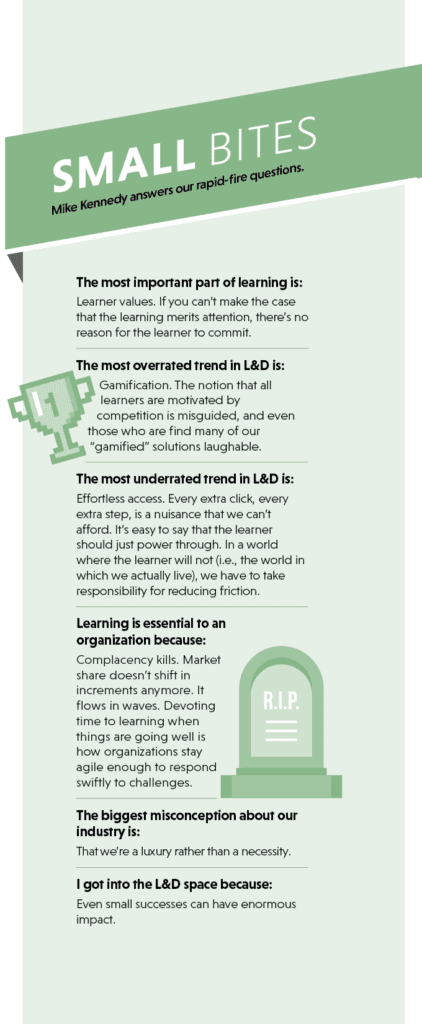Mike Kennedy, learning and development leader and associate vice president at the National Basketball Association, shares his career journey and how he came into L&D.
by Ave Rio
February 25, 2019

What’s been your career path?
I started out with the idea that I was going to be a therapist. My graduate training was in cognitive behavioral psychotherapy and at the time I was working in mental health services. I had the good fortune moving into a training capacity in that field. Once my education was finishing up and I started getting in front of people to practice therapy, I had the harrowing realization that it wasn’t really well-suited to my temperament. Thankfully I had by then discovered that the training department for the mental health agency was something that I was very well-suited for. It took me a while to realize it, but my preparation to be a therapist was actually very helpful at stages of my career — for teaching me some diagnostic tools and giving me the mindset to look more deeply for root causes, as opposed to just solutions, which has given me some differentiation in my field.
From there, I went into corporate life with a couple of smaller roles, in, for example, an engineering company. The more corporate part of my career really started with Tiffany and Co., where I did organizational development work, which was my first exposure to thinking that went beyond just training or even leadership development. That was a critical development stage for me as well. Then, six years with KPMG. I did several different jobs there, some in a learning consultancy practice, some running a training curriculum for the infrastructure part of that organization, and then part of my time was spent with audit learning and design. Then I went to the NBA, where I’m going on my sixth anniversary.
How have your experiences helped shape you and prepare you for your role now?
Going all the way back to my early days in mental health, a bad day in that line of work is something that sticks with you. Every bad day that I’ve had in the world of learning and development is somethin g that in many ways pales by comparison, and so it gives me the opportunity to put it into perspective. A friend of mine used to give me a hard time if I was late to a get-together because I said I had something going on at work, and he would say with some sarcasm, “Oh, you’ve got a training emergency?” I would get very defensive about it and say, “You know, my job matters too.” I eventually realized that’s actually part of what I appreciate about the work that I do: that the bad days are very different than bad days for some other people, but also that a lot of my attention is devoted to strategic thinking and long-term projects.
g that in many ways pales by comparison, and so it gives me the opportunity to put it into perspective. A friend of mine used to give me a hard time if I was late to a get-together because I said I had something going on at work, and he would say with some sarcasm, “Oh, you’ve got a training emergency?” I would get very defensive about it and say, “You know, my job matters too.” I eventually realized that’s actually part of what I appreciate about the work that I do: that the bad days are very different than bad days for some other people, but also that a lot of my attention is devoted to strategic thinking and long-term projects.
What will the CLO role look like in five or 10 years?
The talent-first mindset is becoming more prevalent for the CLO and I think that’s really gratifying. Part of what I’ve brought to my role is more of a mindset toward identifying root causes and finding innovative solutions rather than just waiting to react to whatever problems are going on, and I think that’s a direction that the entire field has moved toward. Moving even further along those lines, we’re going to be much more involved in talent management. And even if CLOs don’t necessarily take over the role or the responsibility of talent management, I think there’s going to be much closer integration of those functions. In the future, the responsibility of the CLO, maybe first and foremost, is going to shift more toward not overseeing curriculums per say, but really having a line of sight to talent within an organization, how that talent is progressing through the organization, and what needs to happen to maximize the way that talent is deployed and strategically aligned with the needs of the organization. Five years from now, I think the CLO will be attending more to those questions than just questions of curriculum design, or competencies and lining up learning to competencies, or even trying to demonstrate return on investment.
What’s the most important career advice you can share with aspiring CLOs?
Ask “why” more. That’s ultimately where I think we have been and can continue to make progress. Be less chained to some of the principles and theories that we’ve followed in the past, and look more closely at the science, being more critical in our thinking. Any CLO is obligated to be able to answer the question “why?” The more that any aspiring CLO is getting comfortable answering the questions of “Why is that the choice that we made? What’s the data? What’s the science behind it?” Or at least, “What’s the principle that informs that?” That’s the single most powerful thing that we can do, both to be successful and to build credibility within our organizations.





